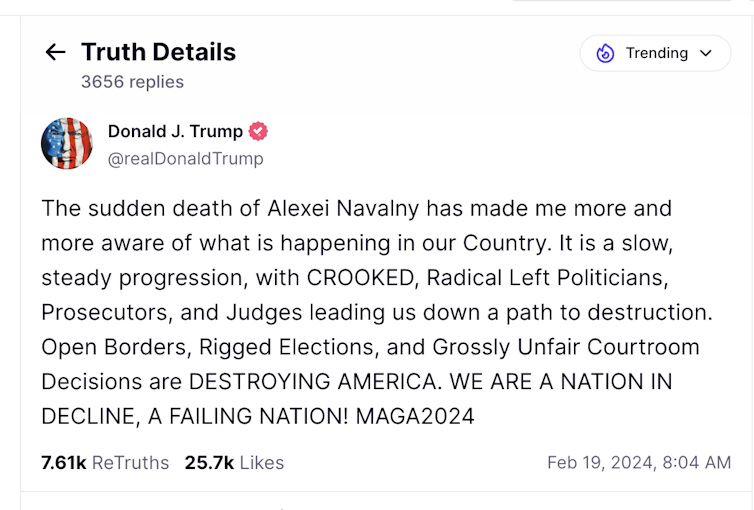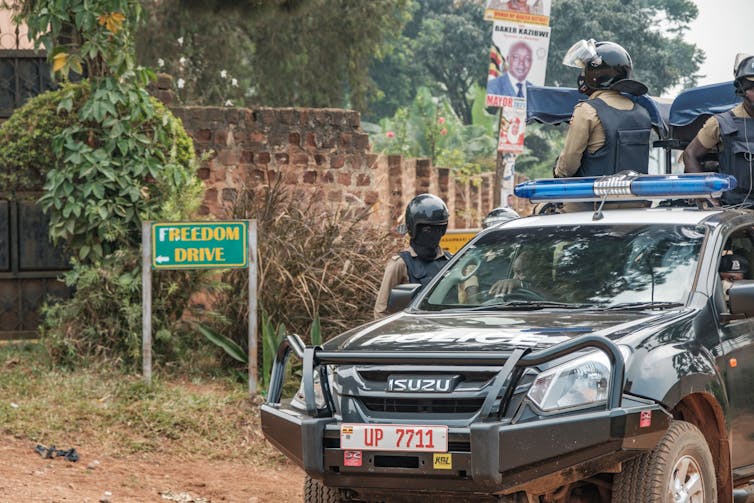
The death of Russian dissident Alexei Navalny, announced on Feb. 16, 2024, lays bare to the world the costs of political persecutions. Although his cause of death remains unknown, the 47-year-old died while serving a 19-year sentence in a Siberian penal colony.
“Three days ago, Vladimir Putin killed my husband,” said Navalny’s widow, Yulia Navalnaya, in a Feb. 19 video.
As an anti-corruption activist turned opposition leader, Navalny shone a light on the brutal excesses of President Putin’s regime. Like Navalny, Putin’s political opponents are routinely subjected to sham investigations, detained without due process and often die under suspicious circumstances. Navalny survived poisoning in 2020.
Not a week since the death and former President Donald Trump already compared himself favorably to Navalny. “The sudden death of Alexei Navalny has made me more and more aware of what is happening in our Country,” Trump wrote on social media. Prosecutors, the courts and his political opponents, including President Joe Biden, were “leading us down a path to destruction” in “slow, steady progression.”
Facing four criminal indictments encompassing 91 felony counts, Trump has often declared that he is the victim of political persecution. His Republican allies in media and government parrot this refrain.
Is there merit to Trump’s claim that the U.S. legal system is little more than the puppet of Putin-like machinations, in which courts are hijacked to knock out political rivals?
I am a scholar who studies the prosecutions of political leaders globally. It is true that such prosecutions have become increasingly common in the past two decades. Often, distinguishing good faith proceedings from bad faith “witch hunts” is not a fact-based exercise, especially for the targets of investigations and among their supporters.
But the law and evidence help to elucidate some themes that lead any reasonable observer to categorically differentiate Navalny – and other victims of bona fide maltreatment – from Trump.

Insulating justice
Legitimate prosecutions involve the rule of law applied, without fear or favor, to alleged violators of statutes or constitutional provisions. Persecutions involve the illegitimate use of law against one’s opponents to gain partisan advantage, also called “lawfare.”
Current and former leaders in democracies with a strong rule of law, including the U.S., have little to fear of persecution, even if more are subject to prosecution.
In corruption trials ranging from former French president Nicolas Sarkozy to Israel’s Prime Minister Benjamin Netanyahu and South Africa’s Jacob Zuma, democracies young and old have proved capable of conducting robust investigations, trials and even detentions of leaders, without officials overstepping constitutional restraints or generating cycles of recrimination.
Whether this world-wide uptick in prosecutions is due to an increasing propensity for executives to commit criminal acts, or reflects improved tools for judicial investigations, matters little. In these cases, as in Trump’s, there was significant evidence of criminal behavior. To ignore that would have undermined, not upheld, the rule of law.
There are safeguards unique to democracies to ensure the impartial application of law, even to current or former heads of government. Under many common law and civil law systems, judicial members are non-partisan and enjoy independence from the political – executive and legislative – branches.
Most democracies allow constitutional review by the courts of executive and legislative actions across different jurisdictions and appellate levels. These reviews guarantee checks and balances between branches but also within the judiciary to prevent any one prosecutor or judge from running amok.
Some prosecutors or judges are elected in the U.S. But criminal indictments can be issued by grand juries, as in Trump’s cases.
Democracies are also self-correcting. In Brazil, then-former president Lula da Silva was tried after leaving office in 2011 on corruption allegations and subsequently jailed. But the Supreme Court annulled the sentence because they determined a prosecutor in the case demonstrated political bias. Lula was released from prison and won re-election in 2022.
Advantages to facing prosecution
Politicians in democracies who are prosecuted will no doubt cry foul and play the victim card. This helps to shore up political muscle, as seen with Lula’s 2022 victory and Trump’s 2024 polling among Republicans and early primary victories.
But for the same reasons, it makes little political sense for their incumbent rivals to weaponize prosecutions. If enough voters think Biden is using prosecutions to sideline Trump, they will surely punish Biden in November.
This is one reason Biden has not spoken about the details of Trump’s cases even as he campaigns against Trump as a threat to democracy.
Similarly, Lula is not commenting about, or intervening in, prosecutors’ investigation of former President Jair Bolsonaro’s alleged involvement in the 2023 insurrection to prevent the transfer of office to Lula.
But prosecutions can certainly become persecutions in settings where the rule of law is weak, democracy has not taken root or an autocratic ruler feels threatened.
What persecution looks like

Today’s world features many petty tyrants of Putin’s ilk, who use the tools of the state to persecute their perceived enemies. Consider Uganda, the focus of the Oscar-nominated documentary “Bobi Wine: The People’s President,” which tells the story of Robert Kyagulanyi Ssentamu, known by his stage name “Bobi Wine.”
Wine is a pop star and anti-corruption activist who uses music to rail against the autocratic rule of President Yoweri Museveni, who has been in power since 1986.
Uganda’s elections have long been marred by intimidation, violence and fraud against the opposition. Nonetheless, after winning a seat in parliament, Wine ran for president against Museveni in 2021.
Public officials acting at Museveni’s behest targeted Wine and his voters through arbitrary detentions, physical abuse and even attempted assassinations. Unsurprisingly, Museveni won an unprecedented sixth term in 2021. Wine has been put under house arrest since.
Like Navalny, Wine is the subject of actual political persecution. It is hard to take seriously the contention by Trump and his allies that Trump is similarly a victim. There is simply no evidence that Biden and prosecutors are engaging in lawfare. Even while under arrest on federal, New York and Georgia charges, Trump can campaign freely.
What should trouble Americans are Trump’s repeated threats in the current campaign to do just what he accuses others of doing: “retribution” against perceived enemies should he prove victorious in 2024.
Whether Trump wins and follows through on promises of lawfare remains to be seen; but if so, that would undoubtedly risk moving the U.S. away from its established rule of law and closer to Russia and Uganda by opening the door for political persecutions.
James D. Long, Professor of Political Science and Co-founder of the Political Economy Forum, University of Washington
This article is republished from The Conversation under a Creative Commons license. Read the original article.







